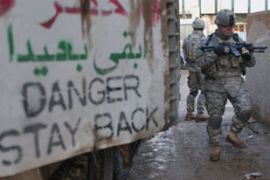Al-Maliki had already announced on Saturday that his government would implement a new security plan for Baghdad, including neighbourhood-by-neighbourhood sweeps by Iraqi forces backed by US troops.
|
|
“Bush’s strategy has failed totally in Iraq and USA has already lost the war. The new plan will not work; it will only bring more deaths and make things in Iraq worst…”
Dimos, Hania-Crete, Greece
Send us your views
|
Hoda Abdel-Hamid, Al Jazeera’s correspondent in Iraq, said: “Al-Maliki has been very stern, warning all militias to give up their arms.”
She said: “He needs to be successful in this step and deliver security to his people. At the moment he is an embattled prime minister.”
Prior to Bush’s speech, a senior Shia official and adviser to al-Maliki, said the prime minister had warned that no militias would be spared in the crackdown.
The official said: “The government has told the Sadrists: ‘If we want to build a state we have no other choice but to attack armed groups.”
One senior US official said al-Maliki had agreed to stop protecting the Mahdi Army under pressure from both the US and his fellow Iraqis.
Political protection
In the past, the Iraqi government has tried to prevent American military operations against the Mahdi Army.
But although al-Maliki has now withdrawn political protection, there is no guarantee the Mahdi Army will be easily displaced from the area of Baghdad under its control.
The Mahdi Army has more fighters, weapons and sophistication now than it did in 2004, when it battled US forces to a standstill in the Shia holy city of Najaf and in Sadr City, a slum area in the northeast Baghdad which serves as headquarters of the Mahdi Army.
Senior officials in al-Sadr’s group said there will be no comment on Bush’s speech until their political council meets later on Thursday.
Hussein al-Falluji, a Sunni official, rejected the plan to increase the number of American troops and warned that it would only increase violence.
“Bush’s plan could be the last attempt to fix the chaos created after the invasion of Iraq. Yet, sending more troops will not end the problem, on the contrary, there will be more bloodshed,” he said.
|
“I think that the solution would be to set an objective timetable for the withdrawal of the American forces and start direct negotiations with the Iraqi resistance”
Hussein al-Falluji,
Sunni official
|
“I think that the solution would be to set an objective timetable for the withdrawal of the American forces and start direct negotiations with the Iraqi resistance.”
Fawaz Gerges, a Middle East analyst, in an interview with Al Jazeera, called the new strategy Bush’s “last card” and a “gamble” that he said “went against the advice of almost the entire political establishment in America”.
He said: “Once again he has chosen to risk the future of his presidency and the military and global strategy of America in the shifting sands of Iraq.”
Instead, Gerges said Bush should “invest serious political capital in the region”.
Kurdish force
Iraqi and US officials said Iraqi commanders will be put in charge of each of nine city districts and each commander will operate independently of Iraqi military headquarters.
The US plans to put 400 to 600 troops in each district as a backup force, a senior Bush administration official said on Wednesday.
Others will be held in reserve throughout the capital to deploy quickly on the request of Iraqi commanders.
An Iraqi general, speaking on condition of anonymity, said a unit of the Iraqi army, composed mainly of Kurds, would be sent into Sadr City.
The general said Kurds, who are Sunni but not Arab, would make up the unit because soldiers from other Iraqi units were likely to refuse to fight fellow Shia.
 |
In his televised speech also on Wednesday Bush
promised 21,500 extra US troops for Iraq [AFP] |
An estimated 80 per cent of Iraq’s army is Shia.
Washington wants al-Maliki to come up with a plan to equitably share Iraq’s oil wealth, ease restrictions on former Ba’ath Party members and hold provincial elections.
The US sees these as important steps to draw Sunnis into the political process.
Elias Hanna, a retired Lebanese general, told Al Jazeera: “I think in order for this [new strategy] to succeed it has to work on a number of levels.”
He said that more important than increasing troop numbers in Iraq was “political reform, amendment of the constitution and the introduction of new laws for the distribution of oil”.

